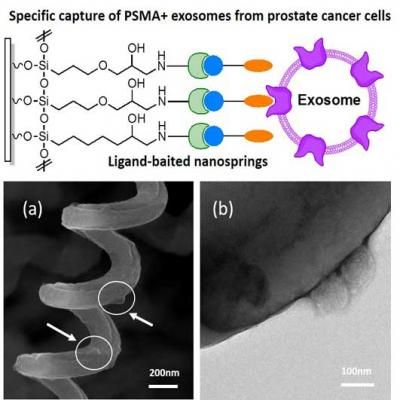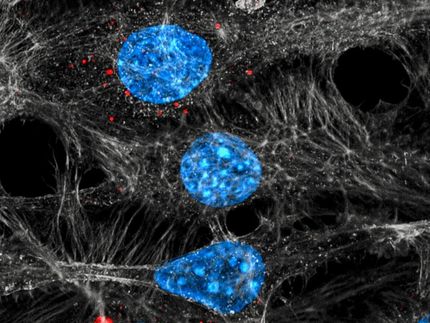New approach for the capture of tumor-derived exosomes from a prostate cancer cell line
Researchers at Washington State University report a new approach for the effective capture of tumor-derived exosomes from a prostate cancer cell line. Exosomes are small secreted vesicles that play a key role in intercellular communication and cancer progression.

Figure a shows captured exosomes on ligand-baited nanosprings, the exosomes are indicated by the arrows. Figure b shows a TEM image of captured exosomes following negative staining with phosphotungstic acid (PTA) PH = 7.1.
Springer Science+Business Media New York 2017
Developing effective and high-throughput selective capture technology for exosomes bearing the prostate-specific membrane antigen (PSMA) biomarker is critical for early diagnostic and prognostic evaluation of prostate cancer and treatment planning. It is known that the prostate tumor enzyme-biomarker PSMA is highly enriched in exosomes secreted by PSMA+ prostate cancer cells. A novel biofunctionalized silica nanostructure was designed to selectivity capture tumor-derived exosomes through the interaction of a known PSMA ligand with the PSMA on the exosomes.
This work enables a non-invasive approach for diagnosis and prognosis of prostate cancer. It overcomes many of the limitations of alternative approaches that are often ineffective in isolating tumor-derived exosomes from those derived from normal tissue because of the low recovery yields and the time required for the process.
The concept was demonstrated using a single cancer type (i.e., prostate cancer), but based on the data presented in this study, the authors expect that a broad panel of biomarker ligands can be baited on the silica nanostructures to selectively capture biomarker-positive exosomes from an array of cell types. Further advantages of the approach used in this study are the ability to isolate a specific subpopulation of exosomes relying on the expression of a specific surface marker as well as improved exosome recovery rate. In the future, the authors envision a microfluidic flow device that will allow for increased exosome capture efficiency and clinical applications.
Original publication
Most read news
Other news from the department science

Get the life science industry in your inbox
By submitting this form you agree that LUMITOS AG will send you the newsletter(s) selected above by email. Your data will not be passed on to third parties. Your data will be stored and processed in accordance with our data protection regulations. LUMITOS may contact you by email for the purpose of advertising or market and opinion surveys. You can revoke your consent at any time without giving reasons to LUMITOS AG, Ernst-Augustin-Str. 2, 12489 Berlin, Germany or by e-mail at revoke@lumitos.com with effect for the future. In addition, each email contains a link to unsubscribe from the corresponding newsletter.





















































